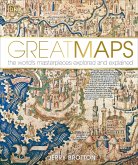North, south, east and west: almost all societies use the four cardinal directions to orientate themselves, to understand who they are by projecting where they are. For millennia, these four directions have been foundational to our travel, navigation and exploration and are central to the imaginative, moral and political geography of virtually every culture in the world. Yet they are far more subjective than we might realise, and we define them in very different ways depending on our locations in time and space.
The Four Points of the Compass takes the reader on a journey of directional discovery, starting with sunrise in the east, moving south to north and ending with sunset in the west. Jerry Brotton reveals why Hebrew culture privileges east (qedem), meaning 'forward' or 'front'; why the Renaissance Europeans began drawing north at the top of their world maps; why the imperial Chinese revered the south as the place from where warm winds came; why the Aztecs used five colour-coded cardinal directions; and why no societies, primitive or modern, have ever orientated themselves westwards, the direction of darkness. Through Brotton's lens, widely used but politically loaded terms such as the 'Middle East', the 'Global South', the 'West Indies', the 'Orient' and the 'western world' can be seen afresh. He shows that thecardinal directions reflect a human desire to create order and that they only have meaning, literally and metaphorically, depending on where you stand. He ends by reflecting on the digital globe, and our new era of disorientation and 'egocentric mapping' in which we, the little blue dot on the screen, have become the most important compass point. By looking at the history of the directions and their meanings in different religions and cultures, Brotton brilliantly charts their framing of the modern world.
The Four Points of the Compass takes the reader on a journey of directional discovery, starting with sunrise in the east, moving south to north and ending with sunset in the west. Jerry Brotton reveals why Hebrew culture privileges east (qedem), meaning 'forward' or 'front'; why the Renaissance Europeans began drawing north at the top of their world maps; why the imperial Chinese revered the south as the place from where warm winds came; why the Aztecs used five colour-coded cardinal directions; and why no societies, primitive or modern, have ever orientated themselves westwards, the direction of darkness. Through Brotton's lens, widely used but politically loaded terms such as the 'Middle East', the 'Global South', the 'West Indies', the 'Orient' and the 'western world' can be seen afresh. He shows that thecardinal directions reflect a human desire to create order and that they only have meaning, literally and metaphorically, depending on where you stand. He ends by reflecting on the digital globe, and our new era of disorientation and 'egocentric mapping' in which we, the little blue dot on the screen, have become the most important compass point. By looking at the history of the directions and their meanings in different religions and cultures, Brotton brilliantly charts their framing of the modern world.








